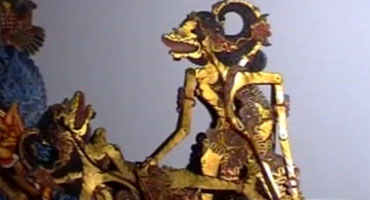
 I agree
I agree
.
Cupu Manik Asthagina [The Asthagina Gemstone Chalice] (2005)
Dalang: Enthus Susmono
How to cite: Enthus Susmono ([2005] 2016), Cupu Manik Asthagina [The Asthagina Gemstone Chalice], translation and notes by Miguel Escobar Varela, Thomas Sembodo and Yosephin Novi Marginingrum. Singapore: Contemporary Wayang Archive. Retrieved from http://cwa-web.org/en/CupuManikAsthagina.
Summary
Guwarso and Guwarsi chase their sister Anjani to get a closer look at a strange object she is carrying. Their father finally intervenes and discovers this object is the Astagina Gemstone Chalice [Cupu Manik Astagina], a container of sacred knowledge. He realizes this was given to his wife, who was having an affair with one of the Gods. As punishment, she is turned into a figure of stone and the children are turned into monkeys. The brothers, now going by the names of Sugriwa and Subali, are tasked with rescuing Dewi Tara, who was captured by an ogre. Sugriwa misunderstands a signal from his brother, and believing he is dead, marries Dewi Tara. Subali feels betrayed and harbors a desire for revenge that will prove important for the Ramayana.
Story: Ramayana
Music: Gamelan
Space: Gedebog, Kelir
Performers: Single Dalang
Puppets: Wayang Kulit Puppets
Language: Javanese
Recording details
Notes: Also known as Sugriwa dan Subali, this performance won Lakon Terbaik [Best Story] at the Festival Wayang Indonesia 2005, which was held in Surabaya, 20 - 24 Desember 2005.
Produced by: Sanggar Satria Laras, Pemkot Tegal, BRI Tegal and Bogasari Indonesia
Recording place: Surabaya, Taman Budaya Jawa Timur "Cak Durasim"
View the metadata record for this resource.
Translation and notes by Miguel Escobar Varela (MEV), Thomas Sembodo (TS) and Yosephin Novi Marginingrum (YNM).
1. The opening song usually explains the theme of the story. Here, the opening song tells the story of a man who is trying to free his children from a curse by urging them to go into the forest TS.
2. Here, the dalang uses the Tegal dialect of the Javanese language TS.
3. A kiyai is a religious expert MEV.
4. Pĕpĕthan is a miniature imitation of an object YNM.
5. Angrastina is the place of residence of Resi Gotama YNM.
6. The wife of Resi Gotama is known by different names, such as: Indardi, Indradi, Windarti, Windradi YNM.
7. This lyric has a philosophical message. When humans are on Earth they will not know the answers to many things. They might look at the clouds in the sky but will never know where is the center of the clouds YNM.
8. The wind can be felt but humans cannot see it. The kale plants are not supported by strong stems. Their stems are only empty cavities YNM.
9. Mban cindhé mban siladan is a Javanese expression which implies favouritism. Mban/ĕmban [to be carried]; cindhé [silk fabric];siladan [bamboo straws]. Literally, "while one is carried in silk, the other is carried in bamboo straws" YNM.
10. Siluman refers to a human that has taken the shape of an animal for nefarious purposes TS.
11. Klumah-klumuh [too weak to walk, lazy] YNM.
12. Kara is a vine (scientific name dolichos lablab). It is often used in Javanese poetry and rhymed riddles YNM.
13. Nyanthuka is the name of the ascetic practice that implies following the habits of a frog YNM.
14. The Pancasunya amulet is sometimes known as Pancasona YNM.
15. The Indonesian government has a program of giving monthly compensation fees for poor people. However there are many cases where the people receiving the money are only pretending to be poor TS.
16. Maésa [goat]; Lembu [cow] YNM.
17. This suluk [sung poetry] describes the loud cry of Mahésa Sura caused by his anger. It is so loud it can destroy a door TS.
18. The English words are used for comic effect and to depict the shallow character of Mahésa Sura YNM.
19. A patih is a government official MEV.
20. Calling someone asu[dog] is an insult in Javanese, perhaps comparable to "damn you!". Maesa Sura uses this word on Lembu Sura, who just replies saying he is a buffalo, not a dog.
21. There is in fact a wayang character, Yamadipati, who takes the souls at the moment of death MEV.
22. "Ora gupak pulut arĕp mèlu mangan nangkané" [You want to eat the Jackfruit without peeling it first], Javanese proverb which means that success requires effort YNM.
23. This proverb implies that by trying to escape a problem, one finds onself in a bigger predicament MEV.
24. This is an expression of anger, with no defined meaning TS.
25. An expression that denotes a lose-lose situation YNM.
26. This song is a reflection on being and not-being. The feathers of the heron bird are usually plain and white. There is no such thing as a striped heron. Likewise, the footsteps of the flying heron cannot be seen YNM.
The honorifics in the original languages were retained in the subtitles. In Javanese and Indonesian, speakers address their interlocutors with over 40 different honorifics which denote differences in their relative status and level of intimacy.
ID = Indonesian
JW = Javanese
Adik. ID. Younger brother/sister. It is used for addressing younger people, not necessarily one's relatives.
Adinda. ID. Younger sister. More intimate than adik.
Babé. ID/Betawi. Familiar form of father, commonly used in Jakarta.
Bé. ID/Betawi. Short form of Babé, father. Jakartan slang.
Bang. ID. Older brother, short form of abang. If used with non-relatives, it is has the connotation of a slang, and is somewhat equivalent to “man” in English.
Bĕndara. JW. Master.
Bibi. JW/ID. Aunt. A way of addressing/referring to older women.
Bos. ID/JW. An adaptation of the English "boss". Used either to refer to one's superior or to a friend in a joking context, for example, when a person orders others around without realizing he/she is doing so.
Bu. ID/JW. Short form of ibu, mother.
Bung. ID. Similar to bang, but slightly less formal. It might mean "comrade". The political leaders of the independence war are often referred to with this term, for example Sukarno is often referred to as
Bung Karno.
Dara. JW. Short form of bĕndara, master.
Dèn. JW. Sir, master, used to address royalty. Short form of radèn.
Dhé. JW. Short form of pakdhé, uncle.
Dhik. JW. Short form of adhik. Younger brother/sister. It is used for addressing younger people, not necessarily one's relatives.
Éyang. JW. Grandfather.
Dimas. JW. Younger brother.
Gusti. JW. Lord. Used to address superiors and Gods.
Ibu. JW/ID. Mother. Used generically to address women who are older than the speaker.
Kakang. JW. Older brother.
Kakang mbok. JW. Older sister.
Kanda. ID. Older brother. Formal.
Kang. JW. Older brother. Informal.
Kangmas. JW. Older brother.
Kaki. JW. Uncle
Kang. JW. Older brother, used generically for men older than the speaker. It is a shortened version of kangmas).
Kakak. JW/ID. Older brother/sister, used generically for people who are older than the speaker.
Lé. JW. Son, short version of tholé.
Lik. JW. Often used between friends as a slang term of address. Uncle, "little father." Short form of {paklik}.
Ma. JW. Same as pak, short form of rama.
Mbak. JW/ID. Older sister. Used generically for women who are slightly older than the speaker.
Mamang. ID. Uncle.
Mang. ID. Uncle, short form of mamang.
Mas. ID. Older brother, used generically for men who are older than the speaker. Although it is also a shortened version of the Javanese kangmas people prefer to use mas in Indonesian and kang in Javanese.
Mas bro. ID. Slang used among male friends. In a way, it is a reduplication.
Mbah. JW/ID Grandfather, grandmother. It is used generically to address people who are much older than the speaker. Short form of simbah.
Mbok. JW. Mother, short form of simbok. Used generically for women who are older than the speaker.
Mbokdhé. JW. Aunt. Literally, "big mother".
Mbul. JW. Informal term of address between close male friends.
Ndara. JW. Master.
Nduk. JW. Daughter, short form of gĕndhuk.
Nggèr. JW. Son, short form of anggèr Used generically for people who are younger than the speaker, with whom the speaker is on intimate terms.
Nimas. JW. Younger sister.
Nok. JW. West Javanese term for daughter, short form of dhénok.
Nona. ID. Miss, unmarried woman.
Paduka. ID. Your Excellency.
Pak. JW/ID. Father, used generically for men who are older than the speaker.
Pakdhé. JW. Uncle. Used to refer to a man who is older than one's father.
Paman. ID. Uncle. Used to refer to a man who is older than one's father.
Pangéran. JW/ID. Prince.
Prabu. JW. King.
Radén. JW. Master, used for royalty.
Rama. JW. Father. It can also be used to designate catholic priests when one is speaking in Indonesian.
Simbah. JW/ID Grandfather, grandmother. It is used generically to address people who are much older than the speaker.
Sinuwun. JW. Very formal way to address a man, reserved for sultans, kings and Gods.
Siwa. JW. Term for addressing older people.
Siwak. JW. Same as Siwa. Term for addressing older people.
Tholé. JW. Son
Tuan. ID. In colonial contexts, this is the way foreigners are addressed but it can also mean sir.
Wa Nĕrpati. JW. Uncle king, equivalent to the Indonesian paman raja.
Wa. JW. For addressing older people, short form of siwa.
Yayi. JW. Younger brother/sister.
Yunda. JW. Older sister.
See the Translation conventions.
Share:
in the translations or data.
